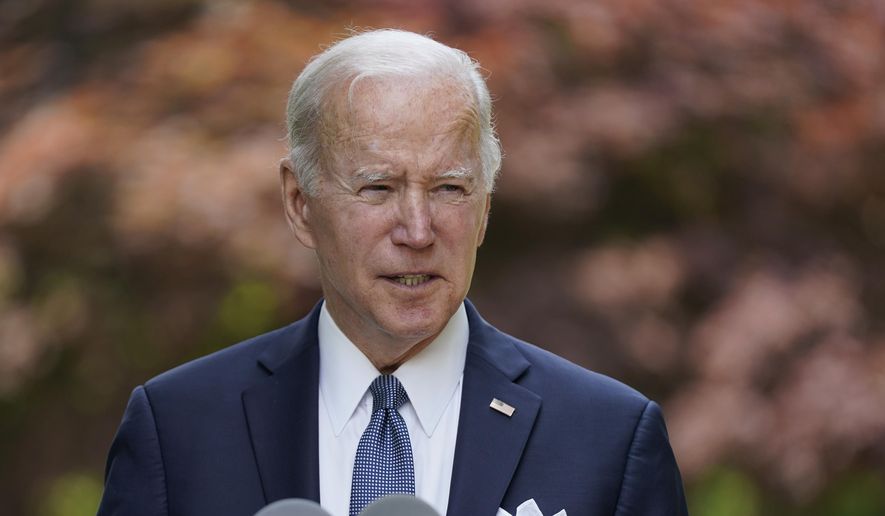The White House released a report Tuesday to show that President Biden’s $1.9 trillion pandemic relief measure of 2021, which is now being blamed for record-high inflation, has succeeded — especially by helping Black people and Hispanic people get jobs and keep their homes.
The review of 32 major programs in the American Rescue Plan, which received no Republican votes in Congress last year, found that the law so far has produced an equitable recovery from the COVID-19 pandemic, said two senior White House officials who spoke for about 20 minutes without mentioning inflation.
“This is the most equitable recovery in terms of jobs and employment that we have ever seen. This was by design,” a senior White House official told reporters in a conference call on Monday.
The 300-page report focuses largely on economic data from 2021, before inflation and gasoline prices hit record highs. Unemployment among Black people saw the biggest calendar-year drop — 2.9 percentage points — since 1983 and is now lower than pre-pandemic levels at 5.9%, the report said.
Unemployment among Hispanic people also fell at a record pace in 2021, 4.5 percentage points, to end the year at 4.9%.
Unemployment among women has fallen from a peak of 16.1% in April 2020 to 3.5% — equal to its pre-pandemic level, the report stated.
The report says the Biden-led economic recovery is far faster than the six-year-long rebound led by former President Obama from the Great Recession of 2008-09.
Congressional Republicans and even some liberal economists say the American Rescue Plan has contributed to higher prices, with inflation topping 8% this spring. High inflation has erased wage gains.
Although average hourly earnings rose by 5.6% in March from the previous year, for example, inflation hit 8.5% in the same time frame.
Mr. Biden also is being heavily criticized for record-high gas prices this spring, and the economic woes are making Democrats increasingly anxious about their prospects in the midterm elections.
“Because of the Biden gas hike, Americans are feeling the pain at the pump now more than ever,” Republican National Committee Chairwoman Ronna McDaniel said on Monday. “Paired with historic inflation and shortages for basic goods like baby formula, the rising cost of gas is the result of Joe Biden and Democrats’ anti-U.S. energy agenda. Unfortunately, Biden only plans to make this crisis worse for families by not doing anything.”
A senior White House official said that although the American Rescue Plan has been fully implemented yet, the president and his advisers believed it was “a good point” in the year to remind the public of the law’s impact.
“We put this report out now, not to say we’re done or ‘mission accomplished,’ but the opposite — to continue the process of sharing information, hearing what is working but also hearing what isn’t working,” one official said.
The report states that the pandemic relief was largely successful at helping to prevent evictions, particularly among Black and Hispanic families. Officials said about 60% of the rental assistance in the past year has gone to Black and Hispanic renters.
The Federal Reserve said Monday that Americans’ financial health reached its highest level in nearly a decade last year, spurred by a strong job market and government support payments.
According to an annual Fed survey conducted last fall, nearly 8 in 10 adults said they were either “doing okay or living comfortably” when it came to their finances in 2021. It was the highest proportion to say so since the survey began in 2013.
People with children also reported a sharp increase in financial well-being, with three-quarters saying they were doing “at least okay” financially, up 8 percentage points from 2020 and 4 points above 2019, before the pandemic.
The boost for parents likely reflected the reopening of schools, Fed officials said, allowing more parents to work and reduce their child care expenses. The expansion of the child tax credit, included in Mr. Biden’s $1.9 trillion financial relief package, was also likely an important factor, Fed officials said.
The Fed did not ask any specific questions of the 11,000 respondents about how inflation was impacting Americans’ financial situations.
• This article is based in part on wire service reports.
For more information, visit The Washington Times COVID-19 resource page.
• Dave Boyer can be reached at dboyer@washingtontimes.com.




Please read our comment policy before commenting.